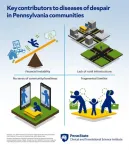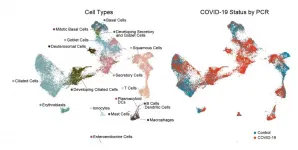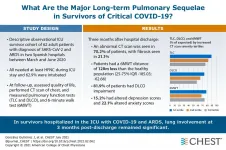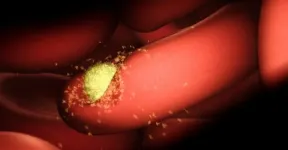'Feel good' brain messenger can be willfully controlled, new study reveals
Neuroscientists show that mice can learn to manipulate random dopamine impulses for reward
2021-07-23
(Press-News.org) From the thrill of hearing an ice cream truck approaching to the spikes of pleasure while sipping a fine wine, the neurological messenger known as dopamine has been popularly described as the brain's "feel good" chemical related to reward and pleasure.
A ubiquitous neurotransmitter that carries signals between brain cells, dopamine, among its many functions, is involved in multiple aspects of cognitive processing. The chemical messenger has been extensively studied from the perspective of external cues, or "deterministic" signals. Instead, University of California San Diego researchers recently set out to investigate less understood aspects related to spontaneous impulses of dopamine. Their results, published July 23 in the journal Current Biology, have shown that mice can willfully manipulate these random dopamine pulses.
Rather than only occurring when presented with pleasurable, or reward-based expectations, UC San Diego graduate student Conrad Foo led research that found that the neocortex in mice is flooded with unpredictable impulses of dopamine that occur approximately once per minute.
Working with colleagues at UC San Diego (Department of Physics and Section of Neurobiology) and the Icahn School of Medicine at Mount Sinai in New York, Foo investigated whether mice are in fact aware that these impulses--documented in the lab through molecular and optical imaging techniques--are actually occurring. The researchers devised a feedback scheme in which mice on a treadmill received a reward if they showed they were able to control the impromptu dopamine signals. Not only were mice aware of these dopamine impulses, the data revealed, but the results confirmed that they learned to anticipate and volitionally act upon a portion of them.
"Critically, mice learned to reliably elicit (dopamine) impulses prior to receiving a reward," the researchers note in the paper. "These effects reversed when the reward was removed. We posit that spontaneous dopamine impulses may serve as a salient cognitive event in behavioral planning."
The researchers say the study opens a new dimension in the study of dopamine and brain dynamics. They now intend to extend this research to explore if and how unpredictable dopamine events drive foraging, which is an essential aspect of seeking sustenance, finding a mate and as a social behavior in colonizing new home bases.
"We further conjecture that an animal's sense of spontaneous dopamine impulses may motivate it to search and forage in the absence of known reward-predictive stimuli," the researchers noted.
In their efforts to control dopamine, the researchers clarified that dopamine appears to invigorate, rather than initiate, motor behavior.
"This started as a serendipitous finding by a talented, and curious, graduate student with intellectual support from a wonderful group of colleagues," said study senior co-author David Kleinfeld, a professor in the Department of Physics (Division of Physical Sciences) and Section of Neurobiology (Division of Biological Sciences). "As an unanticipated result, we spent many long days expanding on the original study and of course performing control experiments to verify the claims. These led to the current conclusions."
INFORMATION:
The full authors list of the paper includes: Conrad Foo, Adrian Lozada, Johnatan Aljadeff, Yulong Li, Jing W. Wang, Paul A. Slesinger and David Kleinfeld.
[Attachments] See images for this press release:
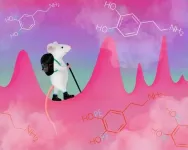
ELSE PRESS RELEASES FROM THIS DATE:
2021-07-23
What The Study Did: Researchers investigated the association between net worth at midlife and subsequent longevity in individuals as well as with siblings and twins.
Authors: Eric D. Finegood, Ph.D., of Northwestern University in Evanston, Illinois, is the corresponding author.
To access the embargoed study: Visit our For The Media website at this link https://media.jamanetwork.com/
(doi:10.1001/jamahealthforum.2021.1652)
Editor's Note: The article includes conflicts of interest and funding/support disclosures. Please see the article for additional information, including ...
2021-07-23
What The Study Did: Using survey responses from students in some Pittsburgh, Pennsylvania, high schools, researchers investigated how experiences of bullying based on race/ethnicity/national origin and other marginalized identities are associated with outcomes for health, mental health and violence among adolescents.
Authors: Chardée A. Galán, Ph.D., of the University of Pittsburgh, is the corresponding author.
To access the embargoed study: Visit our For The Media website at this link https://media.jamanetwork.com/
(doi:10.1001/jamanetworkopen.2021.16364)
Editor's Note: The article includes conflict of interest and funding/support disclosures. Please see the article for additional ...
2021-07-23
Hershey, Pa. -- Financial instability, lack of infrastructure, a deteriorating sense of community and family fragmentation are key contributors to diseases of despair in Pennsylvania communities, according to Penn State College of Medicine and Highmark Health researchers. The researchers conducted four focus groups in Pennsylvania communities identified as having high rates of despair-related illnesses.
Diseases of despair are medical diagnoses involving alcohol-related disorders, substance-related disorders and suicidal thoughts and behavior. Princeton economists Anne Case and Angus Deaton proposed the concept of deaths of despair in 2015 after observing a decline ...
2021-07-23
The body's first encounter with SARS-CoV-2, the virus behind COVID-19, happens in the nose and throat, or nasopharynx. A new study in the journal Cell suggests that the first responses in this battleground help determine who will develop severe disease and who will get through with mild or no illness.
Building on work published last year identifying SARS-CoV-2-susceptible cells, a team of collaborators at Boston Children's Hospital, MIT, and the University of Mississippi Medical Center comprehensively mapped SARS-CoV-2 infection in the nasopharynx. They obtained samples from the nasal swabs ...
2021-07-23
Glenview, Ill. - Published monthly, the journal CHEST® features peer-reviewed, cutting-edge original research in chest medicine: Pulmonary, critical care, sleep medicine and related disciplines. Journal topics include asthma, chest infections, COPD, critical care, diffuse lung disease, education and clinical practice, pulmonology and cardiology, sleep, and thoracic oncology.
The July issue of CHEST journal includes 85 articles, clinically relevant research, reviews, case series, commentary and more. Each month, the journal also offers complementary web and multimedia activities, ...
2021-07-23
Elderly patients with neurological conditions are significantly more likely to develop delirium shortly after they are hospitalised.
A new study has discovered that a delayed transfer to a hospital floor is associated with greater short-term risk of delirium among patients aged 65 and over, and for those who arrive to the Emergency Department (ED) on days with higher risk of prolonged lengths of stay - found to be Sunday and Tuesday.
Delirium is an acute cognitive disorder characterised by altered awareness, attentional deficits, confusion, and disorientation. Current estimates of new-onset delirium highlight the fact that delirium overwhelmingly develops in medical settings (as high as 82 per cent in intensive care settings) compared ...
2021-07-23
Electromagnetic (EM) waves in the terahertz (THz) regime contribute to important applications in communications, security imaging, and bio- and chemical sensing. Such wide applicability has resulted in significant technological progress. However, due to weak interactions between natural materials and THz waves, conventional THz devices are typically bulky and inefficient. Although ultracompact active THz devices do exist, current electronic and photonic approaches to dynamic control have lacked efficiency.
Recently, rapid developments in metasurfaces have opened new possibilities for the creation of high-efficiency, ultracompact THz ...
2021-07-23
SAN FRANCISCO, CA--July 22, 2021--To speed up a chemical reaction, a chemist might place the reactants over a Bunsen burner. Adding heat increases the degree of random movements and collisions of particles, accelerating the reaction.
In cell biology, one important "reaction" is the transformation of stem cells into all the other cells in the body, a process known as differentiation. Gladstone Institutes researchers have now discovered a molecular mechanism that acts like a Bunsen burner to "turn up the heat" and accelerate differentiation.
However, instead of boosting temperature, this process amplifies random fluctuations ...
2021-07-23
New York, NY (July 23, 2021) -- Mount Sinai researchers have developed a therapeutic agent that shows high effectiveness in vitro at disrupting a biological pathway that helps cancer survive, according to a paper published in Cancer Discovery, a journal of the American Association for Cancer Research, in July.
The therapy is an engineered molecule, named MS21, that causes the degradation of AKT, an enzyme that is overly active in many cancers. This study laid out evidence that pharmacological degradation of AKT is a viable treatment for cancers with mutations in certain genes.
AKT is a cancer gene that encodes an enzyme that is frequently abnormally activated in cancer cells to stimulate tumor growth. Degradation of ...
2021-07-23
Advanced technologies have been used to solve a long-standing mystery about why some people develop serious illness when they are infected with the malaria parasite, while others carry the infection asymptomatically.
An international team used mass cytometry - an in-depth way of characterising individual cells - and machine learning to discover 'immune signatures' associated with symptomatic or asymptomatic infections in people infected with the Plasmodium vivax parasite. This uncovered an unexpected role for immune T cells in protection against malaria, ...
LAST 30 PRESS RELEASES:
[Press-News.org] 'Feel good' brain messenger can be willfully controlled, new study reveals
Neuroscientists show that mice can learn to manipulate random dopamine impulses for reward

